SPOILER ALERT: This blog is for those who are watching season six of Mad Men. Don't read on if you haven't seen episode 13.
Catch up with Paul MacInnes' episode 12 blog here.
'The only unpardonable sin is to believe that God cannot forgive you' – unknown preacher
Don Draper has been cast out. He's the new Freddy Rumsen, except the consequences of Freddy's destructive coup de theatre could at least be cleaned up with a cloth. Having persuaded the previously advertising-resistant chocolate behemoth Hershey's into a room, Don promptly scares them away again by confessing to having fed his childhood appetite for Hershey bars by robbing johns in the whorehouse he called home. Eyes bore into him from around the room and, on Thanksgiving morning, he's told he's being given a few months off with no fixed return date. Don looks at Roger in the hope of explanation, solace or just a conspiratorial wink. "Try and see it from our side," comes the response.
A line has been drawn, and from my point of view it's a good thing. As the only Don admirer left in the room, I want the hero of this drama to thrive. I want him to understand himself, to control his egregious impulses, to make the best use of his talent. I don't want him puking up at wakes or conducting brooding vigils outside his neighbour's door. That Don's creative genius stems in some way from his damaged and hidden past is apparent, but this season has shown Don's demons in danger of overwhelming him and nobody wants that. Well, I don't, anyway.
What happened in this episode amounted to a self-detonated intervention. After slapping a cleric in a dive bar, Don wakes up in the drunk tank. "I shouldn't be in here!" he exclaims, but the irony is lost on no one, not even himself. The next thing we know, the domestic drinks cabinet is being chucked down the sink, Don is claiming Stan Rizzo's idea for a California office as his own and he's pledging a new start for Megan, one that will support her career as a terrible actress. The man is determined to make a change.
Sitting in the room with Hershey's, however, he realises that such a change is not as easy as all that. Milquetoast Ted has already pointed out that a drunk who thinks he can make himself sober overnight has another think coming (Ted has seen such behaviour in his father, he says, that one remark revealing more about his character than most of what we've seen elsewhere this season). Don takes Ted's advice and throws back a sharpener, but it doesn't stop the shakes kicking in. As he looks at his trembling hands – a sign of vulnerability as well as illness – he feels compelled to make his confession.
That confession not only sees him removed from his job, but might also lose him his wife. "You want to be alone with your liquor and your ex-wife and your screwed up kids," rails Megan (which is a bit unfair on Gene), before storming out of the flat. All this at just the point that Don has apparently resolved to do something to fix all that.
It's part of the Alcoholics Anonymous mantra that all drunks must hit bottom before they can get better, and this is surely what we have seen happen to Don. On the one hand things could not get any worse, but on the other he has faced up to his problems, and his secrets are out. The final scene of the season sees Don showing his old home, now dilapidated, to his children. Bobby and Gene are there. So is Sally. It was being caught in the act by his only daughter that sent Don on his most destructive jag and now he wants, in his own reserved way, to try to start explaining why that happened. They stand outside the house and Sally turns towards her father with a combined look of puzzlement and disgust. He looks back at her and as she turns away, you can see the cogs start to whir. There's hope for them both yet.
******
Pete Campbell experiences his own decline and fall this week – and while it may have been eclipsed by Don's, it does at least involve a Camaro Z28. The action begins on the high seas, where Pete's mother has gone missing after apparently hitching herself to studly Spanish doctor Manolo (or, as his birth certificate would have it, Marcus Constantine, so what was with all the Spanish the other week I do not know). Pete, obviously, is incredibly distressed by the news. Not out of concern for his mother, of course, but because he thinks Bob is stitching him up. Cue a tirade in the lifts that has already been added to the pantheon of classic Campbell meltdowns.
Next, we're in Detroit, and Pete appears to have gone from overwhelming distress back to his more traditional mode of blase snideness. An attempt to cut Bob out of lunch with the Chevy executives (surely a blessing in disguise) backfires, and smart-as-a-whippet Bob immediately forces Pete into a compromising situation. That situation is a stick shift, which Pete is spectacularly unqualified to operate and ends up smacking into reverse, knocking over a hoarding in the process. If being unwilling to kill animals was enough to get Ken cast out by GM, imagine what being unable to drive a car would do.
We don't need to imagine for long. Pete is quickly removed from the account. I should add that I believe we are to assume he's been removed from the account, though it's never articulated that he has been. Neither is it announced that Pete will move to California instead, but again that turns out to be the case. And the mass conspiracy involving his mother falls away rather promptly, too, although we can at least peg that on his reluctance to blow any money on investigating her disappearance.
Pete's demise is, perhaps, scrappily written, but it is redeemed by a tender scene between him and his estranged family. Trudy appears calm, composed and willing to wish Pete the best in his life (again it's slightly unclear as to why she should be this way, but still). She makes it clear that, just like Don, Pete's crash could prove liberating. "You're free of her, you're free of them, [meaningful pause] you're free of everything." Pete says it's not the way he would have wanted it. "Well now you know that," she retorts, and the last shot in the scene is of Trudie's tender expression as she watches Pete say goodbye to their daughter.
******
As Don and Pete fall, so Peggy rises. The last we see of her is a re-creation of a classic Mad Men image: staring out of the window of the corner office. She's inherited Don's desk, his whiskey collection and, most likely, his role as the chief creative in SC&P.
The problem with Peggy's position, though, is the sense that she's got there by default. Don's demise means there's a gap, but it's Ted's decision to move to California that means she's the one who fills it. Ted has of course gone to LA to escape Peggy, escape his own weakness that saw him unable to resist his feelings for Peggy or endure the guilt of breaking up his family. He makes the choice to go one way only a day after insisting he would go the other. Proof, if it were needed, that he is not the "good angel" to Don's bad. What he does have though, as Peggy points out to him in their last, saddening encounter, is a choice. "Well aren't you lucky," she spits, "to have decisions."
*******
This week's notes
I really thought that Roger Sterling was going to get it this week. I thought it was either the fatal heart attack or the leap from the ledge. His secretary's warning to Joan was classic misdirection, and I pay thanks to the gods of 1960s dramatic reconstruction that he'll be around next year. But perhaps this ultimately inconsequential plotline could have been sheared down a little in order to make other aspects of the episode a little more comprehensible (in his customary end-of-season interview with Alan Sepinwall, Matthew Weiner reveals that Joan did win the Avon account after all, something I certainly hadn't deduced).
Bob Benson ends the season carving turkey, ensconced in the heart of the Holloway home. He's certainly the season's main winner, though what his endgame is remains just as mysterious as ever. Not sure he looks great in a pinny, either.
Poor old Stan Rizzo. The best idea he's had in years and it's pinched from under his nose. Still you can't spend half your life caning it and expect suddenly to jump to the top of the tree. A reminder to you kids out there – don't do drugs. In the office.
Time stamps
As Don gets into his contretemps with the man of God, he lets us know that Nixon won the '68 election after all. We don't even know which way they all voted, though if I had to make a call, I'd say Bert Cooper plumped Republican.
And finally
Thanks for all your comments and interactions. I personally think that it was up there with the best seasons, and I'm confident of a satisfying resolution next year. Hope to see you all then.
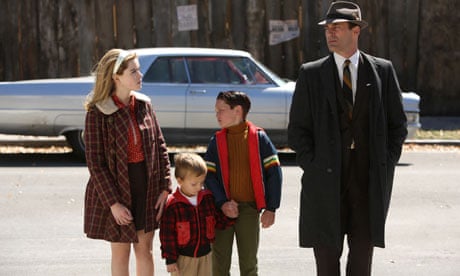


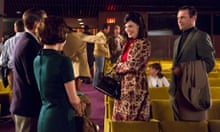
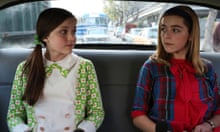

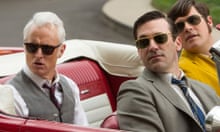
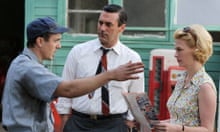
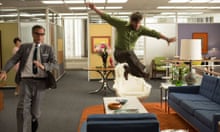
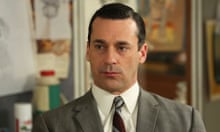
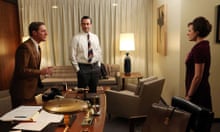
Comments (…)
Sign in or create your Guardian account to join the discussion